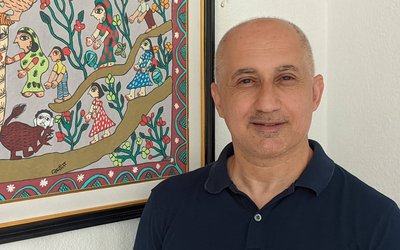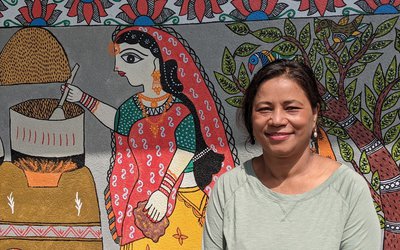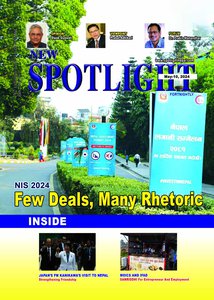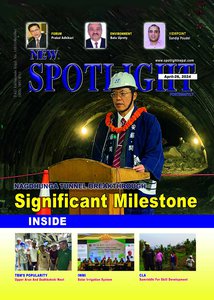Constitutional Committee (CC) chairman NILAMBER ACHARYA is an experienced hand in drafting the constitution. Former law minister Acharya played a key role in finalizing the Constitution of Kingdom of Nepal 1990. Despite his experience, however, Acharya is facing a tough time in accomplishing his task at the Constituent Assembly (CA). Although his committee is given the role to prepare the draft of the new constitution, it has yet to receive thematic committee reports, several of which are fraught with contradictions and political differences on constitutional issues. Instead of making the constitution through the CA, political parties recently formed an all party committee to settle their disputes. In that context, CC chairman Acharya spoke to KESHAB POUDEL on various issues in current debates. Excerpts:
It is reported that you expressed dissatisfaction over the formation of political committee under the leadership of Maoist Chairman Pushpa Kamal Dahal Prachanda? Don’t you think this kind of committee is necessary to write the constitution given wide ranging differences on thematic committee reports?
The question is not who expressed what. On my part, I am the chairperson of the Constitutional Committee of the Constituent Assembly and the role of my committee is to draft the constitution on the basis of thematic committee reports. First of all, we need to understand that the task force is political and it has no constitutional validity and it is not set up by the CA. There is no provision in the constitution for such a task force. This is purely a political committee. My expression is based on reality and it is not dissatisfaction.
But political leaders are saying that your statement is an expression of disappointment?
It is up to them how they take my statement. What I am talking about is the constitutional and legal status of the body. The task force is set up in haste. Had they held discussions and evaluated the delay in the process before forming such a political committee? I have not read anything about this. Since the senior leaders of all political parties are involved in the committee, they have to convince the people about the need of the task force, they need to assure the people about it.
Do you think the task force was set up to accelerate the process of constitution writing?
Looking at the present state, one can easily draw the conclusion that the constitution writing is not their priority even now. Since there remain wider differences in fundamental issues like forms of government, forms of legislature, federal structures, and judiciary and so on, the task force cannot bring any drastic change in 11 days. Political parties still firmly stand on their political ideologies. I have not seen any change on this. Even chairman of the committee and Maoist leader Prachanda left for Beijing showing where his party’s priority is.
Whom do you blame for the delay in the task?
The constitution writing process was delayed not due to the top political leadership. They formed the task force to cover their mistakes, to demonstrate that the process of constitution making is rolling. There is no reason to believe that this kind of task force will solve the problems. This is just to shift the burden of blame to others.
What should have been done?
Had this kind of task been formed before the presentation of reports by thematic committees, it would have supported the process a lot. Political leaders did not intervene when thematic committees sent their reports full of contradictions. It is unfortunate that political leaders let the reports to pass by majority votes.
What is wrong in sorting out the differences now?
Instead of concentrating on settling the differences in thematic committee reports, we are giving priority to other areas. For instance, there is the need to agree on fundamental issues of constitution. The issues like judicial systems, form of government and forms of federal structure states, forms of legislature organs and relations among them are yet to be settled. There are wide differences among major political parties in all these issues. Instead of giving priority to settle these issues, discussions are taking place in other areas.
Don’t you think the task force will make it easier for you to write the constitution?
I don’t think we can write the constitution without understanding and consensus on these issues. I don’t think we can overcome the current impasse without making consensus on fundamentals of the constitution.
If the committee comprised of all senior leaders of political parties fails, what will be the consequences?
If it fails to settle the issues, it will send a very wrong message to the people. The common people will lose faith on the leadership. Instead of being directly involved in the process through the taskforce, political leaders should have encouraged CA’s committees to settle the issues.
In case of early intervention by the political leaders, do you think the situation would have been different?
Had political leaders intervened in the early stage, the constitution making process would not have been delayed. Had the Constituent Assembly sent reports to the Constitutional Committee in time, we would have prepared the first draft by now. Nobody showed interest when they had adequate time to settle differences.
Political leaders were unable to build consensus on the fundamental questions of the constitution in the last two and a half years. Why did they agree to form a political task force now?
Only one motive of this political committee is to show to the people that political leaders are sincere and avoid public blame. As you know, the CA was supposed to send the reports of thematic committees to the CC by the end of Asoj. When political leaders perceived that they cannot complete their tasks, they formed the task force to shift the blame. They have to answer why there was the delay and somebody needs to take the responsibility for this. This is a political exercise to divert public criticism.
As the CC chairman, what is your take on this?
Shall I express happiness or disappointment when my committee did not receive thematic committee reports? I am definitely disappointed about the situation. However, political leaders requested me to express my happiness over the constitution of the political task force. How can I express happiness when I can see nothing is moving, when CA is unable to send the report to my committee? I feel disappointed because I did not get the reports. Who is responsible for this? One needs diagnosis to find causes and reasons behind it.
What would be the solution?
In the present state of urgency, leaders of political parties have to find out the reasons behind the delay in the process to send the reports of thematic committees to CC. Another important thing they need to do is to determine their constitutional destination. In which destination do they want to go? For instance, presidential system or parliamentary system, independent judiciary or otherwise, unicameral legislature or bi-cameral, the elections etc. It is very unfortunate that the political leaders are yet to agree on what kind of political system they want to have. Interestingly, there is no majority report in the form of government.
Civil society members who used to get actively involved in the process seem defunct too. How do you look at this?
I don’t agree that civil society is defunct, it is rather more vibrant now. There is a little bit confusion about the concept of civil society. For instance, the civil society consists of organized social organizations like universities and media. Civil society does not mean particular individuals. If you see activities of the civil society on the basis of certain individuals, you may have different results. Civil society is not a concept about recognizing a group of certain individuals but it is based on broader concepts. As media has been actively taking part in the process, I don’t think one can say that civil society is ineffective or defunct. There is the need to raise more voices.
As political leaders fail to draft the constitution, they have been blaming one another for working to revive the monarchy and the old system. What do you say on this?
Of course, the blame game is going on. I don’t think there is any possibility for revival of monarchy or Shah Dynasty again. Former King Gyanendra may join politics in one or other forms but it is no more than a personal imagination to think about the revival of monarchy.
How much hopeful are you about the CA being able to write the constitution?
I am hopeful that we will write the constitution through CA. Of course, it will take a little bit time but we will be able to produce the new constitution. If political leaders build consensus on fundamentals of constitution, we can write it anytime. We have expertise as well as the capability.
- NIS 2024: Few Deals, Many Rhetoric
- May 12, 2024
- LATE SAMBHU PRASAD GYAWALI: Legendry Lawyer
- May 03, 2024
- TBM’S POPULARITY: Upper Arun And Dudhkohshi Next
- May 02, 2024
- QATAR AMIR’S STATE VISIT: Five Agreements
- Apr 28, 2024
- BIPIN JOSHI: Call For Release
- Apr 21, 2024
















